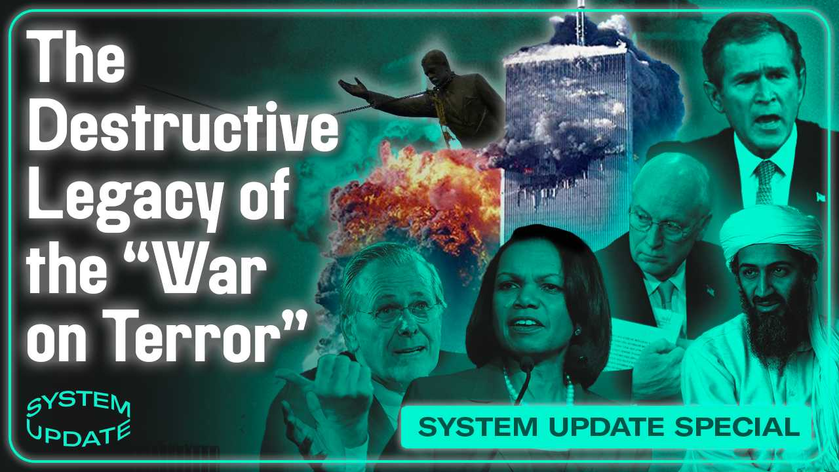Watch the full episode here:

Good evening. It's Friday, October 20.
Tonight: Ever since Hamas executed a massacre inside Israel on October 7 and Israeli Prime Minister Benjamin Netanyahu then vowed reprisals that would extract what he called “an unprecedented” cost, we have been urging on this program that the lessons of the U.S.'s multiyear multi war response to the 9/11 attack be remembered and then applied. But to apply those lessons, one must first know what those lessons are.
It has now been 22 years since the 9/11 attack took place. There are many millions of Americans who are too young to have experienced it as cognizant adults and millions more who were not even born then. Even for those old enough to have lived through these events as adults, it is very easy to forget history.
Each year, memories fade or become distorted – sometimes deliberately. Given how many Bush-Cheney operatives and agents of the U.S. security state under Bush and Obama are now embedded in our nation's largest media corporations – supreme War on Terror propagandist and liar, Jeffrey Goldberg was promoted as a reward for his lies to run the Atlantic, where he features warriors on terror, such as the neocon speechwriter for the Bush White House, David Frum; while the actual spokesperson for the Bush-Cheney White House, Nicolle Wallace, has become one of the most popular MSNBC hosts and CIA chiefs, such as John Brennan, David Petraeus and Michael Hayden, are all employed by or regularly featured in the most influential media corporations. There has been a deliberate campaign to minimize or even deny the crimes and destruction of their War on Terror policies, in part to rehabilitate both them and their militarist and warmongering ideology, but also in order to pick Donald Trump rather than themselves as unprecedented evil, as the low point of American war crimes and threats to our democratic fabric.
The reaction of the United States to 9/11 is more than anything else what drove me to leave the practice of law to start working in journalism in 2005, and more than any one specific policy what alarmed me the most about the post-9/11 climate was the repressive environment that emerged from the start. Bush, Cheney and their team of neocon speechwriters and propagandists insisted – often explicitly – that anyone dissenting from or even questioning their decrees was not just wrong, but was “pro-terrorist,” a traitor on the other side, the side of al-Qaida. Blatant lies, media disinformation campaigns, character assassinations and smears were pervasive, all to impose a cost on critics so severe and irreparable that many were deterred by design from speaking up.
The 9/11 attacks provoked as much unified and righteous rage as the recent Hamas attack in Israel did. As a result, everything proposed by the U.S. government in its wake – new wars, coups, massive civilian killing, bombing campaigns glorified under the name “shock and awe,” torture, kidnapping programs and a radical transformation of our domestic politics to formalize into law previously unthinkable authoritarian powers in the Patriot Act and warrantless spying – all of that was deemed inherently just. After all, we were attacked by savage and primitive terrorists. What decent person would possibly oppose policies justified in the name of destroying those terrorists and keeping us safe? How could anyone then, other than a traitor or a terrorist supporter, possibly oppose the Patriot Act? I mean, it says right in the name that it's intended to fortify American patriotism. The only possible motive someone might have for objecting to U.S. government wars and other policies justified in the name of crushing the terrorists is because someone was either weak when it came to confronting the terrorists or because one was pro-al-Qaida or pro-terrorist.
That repressive and manipulative climate that was immediately imposed in the wake of 9/11 was made possible by exploiting the emotions of decent people who were genuinely enraged by the 9/11 attack and who wanted to avenge the death of 3,000 of their fellow citizens and avenge the humiliation imposed on their country. But within a relatively short period, Americans came to regret many of the policies they were induced to applaud. They came to realize that not every policy is justified in the name of crushing the terrorists and, most definitely, not every war justified because it was necessary to keep us safe was, in fact, justifiable or wise – to the contrary. Many of those policies ended up being deeply counterproductive, far more likely to fuel terrorism against Americans than stop it. In many cases, they were shameful, criminal and morally reprehensible.
Those are the key lessons of 9/11, ones which are always worth applying, especially when our government is yet again proposing that we involve ourselves in a new war by arming, funding and fueling one of the parties to that war or otherwise involve our military in a new conflict – as President Biden has already done by deploying aircraft carriers to the region and threatening deterrence and reprisals against other parties that might get involved. However, we often forget the most vital historical lessons because the passage of time and the emotions of more recent events lead us to forget, and far more commonly and destructively, because our leaders and their institutions of authority want us to forget – or at least to misremember it – because they were the authors of those crimes, of the lies and disastrous choices, and their self-preservation and ongoing power require that those lessons be forgotten. The history of the War on Terror and the disasters spawned by the U.S. War on Terror are often ugly and depressing. That is precisely why it is so vital that we stop and document them, remember them, and then apply them to newly proposed wars.
For now, welcome to a new episode of System Update, starting right now.






















